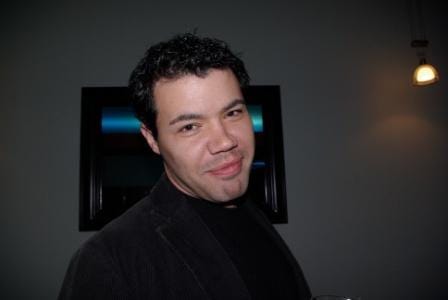This feels like blogging again. But I can't go back to the 2000s
Reader, meet writer's brain.

As I begin regularly posting here at ReportEarth — in a sense resuming a bloglike existence after more than a 10 year hiatus — I feel some history is in order.
In the year 2002, I was 24 and working at the American Prospect magazine. Many writers whose names you know today — Ezra Klein, Matthew Yglesias, Jamelle Bouie, Dana Goldstein and many more — came up through this shop, which is well-recognized for offering young writers a road into thoughtful policy journalism (with a liberal bent).
For me, it turned out, it was also a wonderful path into a particular quasi-journalistic technology that was then changing the media — blogging.
While I do not remember the exact chain of events, in 2002 Nicholas Confessore (now at the New York Times) and I launched a blog called “Tapped” (some more of that history is reported here). The blog posted constantly and in all manner of voices, without bylines at first, which was as much a necessity as a style, as multiple people were actually writing the stuff. They all referred to themselves as “Tapped,” aka, “Tapped thinks…”, “we….” It was a collective.
Audiences loved it. As Klein would later write:
I was a freshman in college when I stumbled across it. I don’t remember how I got there. But I was addicted almost instantly. It was like nothing I had ever read before. It was fun, and it was urgent, and it made me feel like I actually understood what was going on. It took issues seriously without taking itself seriously. And it was rare.
Multiple other writers who later came through the Prospect, like Klein, would also become Tapped contributors. As Klein went on to remark, “without Tapped, there would certainly be no Vox,” the publication he went on to create (with Yglesias and Melissa Bell) in 2014.
I reflect on this now because here I am posting in a new — but very much related — model. The Substack Post itself declared two years ago: “The blogging boom is back—and it’s happening on Substack.”
I feel the similarity. But I can’t just go back into the mode. I’ve changed a lot and fundamentally — an early, important disclosure to the reader who may remember me — this brain just ain’t wired the same.
I went from Tapped and the Prospect to being a freelance writer, launching my own blog — “The Intersection.” It was my first personal writing brand and a fairly successful one, though I didn’t really realize what that meant at the time.
Later, “The Intersection” moved to ScienceBlogs.com and later still, the website of Discover magazine. At the time, science blogging felt like the big new sci-comm innovation. Yet now I wonder if most of it wasn’t happening in a snowglobe world, with views all ricocheting off the inside of the sphere.

Science blogging was a genre change, but not a major brain change. Not that I trust my memory — after writing this post, who could? — but I remember my writing style at “The Intersection” being just as fluid, just as improvisational in style, as Tapped had been.
No, what changed the Alpha and GABA of my writing was spending nearly a decade at a major newspaper (The Washington Post). There are some writers who manage to be major media reporters, and yet can maintain that personal and freewheeling approach on social media that I once had in blogging.
For me, that’s a struggle.
I’m not sure exactly what brought on the change. Partly it must have been just aging. It was also that, working for a “paper of record,” what you said and how you said it felt more formal and weighty.
Newspapers print for the world — and imprint on their employees. You’re part of a tradition larger than yourself, and so you strive to adhere to the institution’s norms, notably including keeping yourself out of the story.
There’s much to be said for this way of doing things. But the approach doesn’t necessarily lend itself to vibrant personality, or the sort of quick sharing with an audience and letting them connect with you, that works well in social media, and that once worked well in blogging. Or at least, it didn’t for me.
So now that I’m here, what does this mean for my content?
Well, now I’m trying to move in another direction, but I’m going to be honest — and as I’ve already kind of touched on — it is challenging.
I certainly won’t stop approaching information as a professional reporter first. That means, among other things, carefully checking facts and finding out what other relevant voices have to say about them. It means remaining open-minded, willing to revise and correct information when needed. It basically means trying to maintain a scientific mindset, insofar as is possible.
But I’m going to try to put more of myself into it too, like I have here, and also in my first two major posts (about lost newspaper jobs and the enormous amount of climate research now being published).
Just maybe, the combination of everything I learned in the newsroom, and a little more homage to my bloggy roots, will make me a more successful contributor here at ReportEarth than I was at the Intersection, or elsewhere. That’s the hope, anyway.
But bear with me. It’s going to be a transition, and I’m not sure how it could be otherwise. My ship of Theseus isn’t made of the same material. I hope it’s stronger, but it can be fussy and creaky as well.
Speaking of newspapers
Three weeks ago, in one of my first posts here, I wrote about the precipitous, multi-decade decline of U.S. newspaper jobs. At the time, despite that broader picture, the most recent figures from the Bureau of Labor Statistics did show a slight jobs uptick from December 2024 (86,000 jobs) to January 2025 (87,000 jobs), based on preliminary numbers. I suggested that this could possibly represent a staffing up for Trump II.
Or not. The new BLS numbers are out and February, preliminarily, shows a drop down to 85,000, which feels more like a continuation of the long-term decline. We should be hesitant about any strong interpretations in either direction, however, as we watch more 2025 data come in.
In the meantime, I’ve updated my chart, but it’s really just adding a tiny new slice of data to the more than 400 months represented here:
I’ll keep tracking these data, and aim to update this chart monthly.





Thanks for this very interesting perspective on how writing changes. I feel quite a lot of this change and I think part of it is just becoming more and more aware of the impact of your own writing on readers. When you write about things that change people, or affect the wider perception of other people's work, you have to approach it with a level of seriousness even if you keep a lighter voice.
Hi John,
Appreciate you reading here and sharing your thoughts. Couldn't agree more with that feeling of knowing the impact that this kind of work can have. I do think being in the newspaper world brings that home to you in a big way.